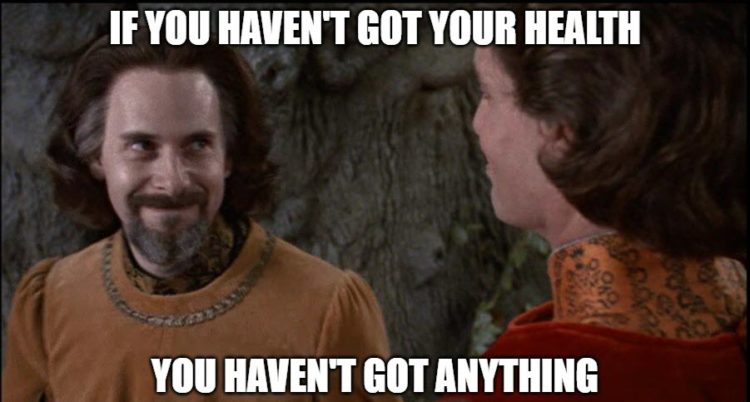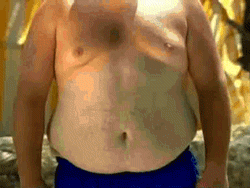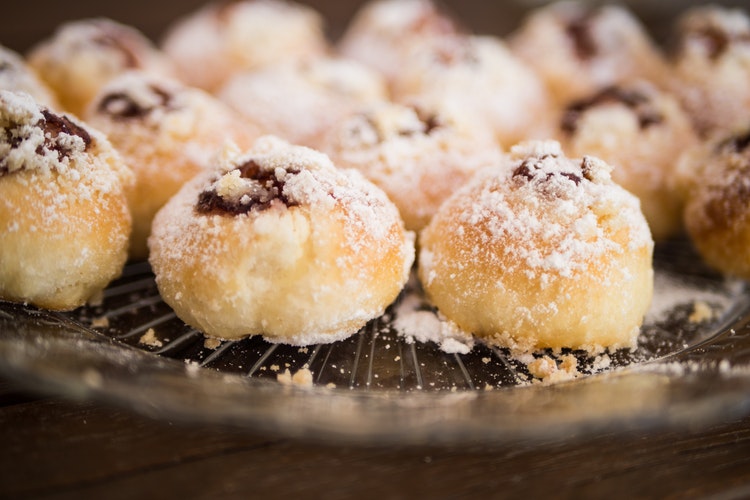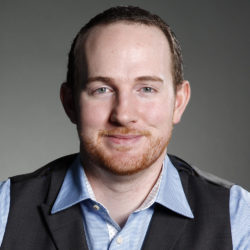
Let’s face it…in this, the Six Fingered Man certainly knew what he was talking about 😂
Ever since I first started body building in high school, I’ve been fascinated by the world of health and fitness. Nutrition, diet, fasting, supplements, exercise, MED, you name it, I’ve gone deep into everything. And there’s a LOT to dig through. Some areas are fairly dialed in, but there are also a lot of things still up for debate or unknown, so consider this a work in progress.
I think the best way to go about this will be to walk through how I currently optimize my own health, and the reasons why I do what I do, but before I do that there’s an important caveat.
There is a LOT that is still unknown, and every body is at least somewhat different, so there is no singular WAY to health and fitness. My path and your path will differ.
Your genetics, your environment, your microbiome, your lifestyle, your diet…there are SO many elements that come into play, and no two people are exactly the same (even twins are going to have diverging factors).
So, that said, let’s dig in! I’m going to break this into 7 sections: Exercise, Diet, Eating Patterns, Breathing, Sleep, Supplements, and Risk.
These are the 7 pillars of health and longevity, and coupled with data to help inform your decisions, represent the control levers available to you to optimize your health and longevity.
Without further ado:
Exercise

Say what you will, but I think everyone can generally agree that exercise is good for you. But there are still a lot of things that are up in the air. How much exercise do you really need? What kinds? What frequency?
If you spend even 5 minutes poking around the internet, you’ll quickly find that everyone has different answers, and you’ll probably end up more confused than ever. I can’t tell you precisely what YOU should do, but I will tell you what I do and why, and hopefully you can take the principles and build something that works for you.
First, there are roughly 2 buckets of exercise, aerobic (emphasizing endurance and cardiovascular health), and anaerobic (emphasizing muscle growth and strength).
Vascular diseases are the #1 global cause of death (heart attacks, strokes, clots, aneurisms, embolisms, Alzheimer’s (tied to amyloid plaque buildup), and vascular dementia), so you definitely want aerobic exercise in the mix to keep your vascular system in tip top shape.
But reduced mobility and musculoskeletal injuries increase as you age and can also contribute to an early demise, and having additional muscle mass not only protects you from those things to a greater degree, but also increases your basal metabolic rate, so you definitely want anaerobic exercise in the mix.
Aerobic is fundamentally about amount of time spent in certain heart rate zones (60-80%) while breathing deeply (running, rowing, etc.), while anaerobic is about short sets of specific exercises under tension (your heart rate can actually top 80% doing anaerobic exercise, but for very short periods) with rest between sets (a form of HIIT, or high intensity interval training).
You need a bit of both.
First, as I have amply covered previously, I am LAZY as fuck. So, my first pass has been to try and determine the MED (minimum effective dose) for everything I do health-wise. There is no way I’ll spend 2+ hours a day in the gym like Dwayne Johnson, or 3-5 hours a day like an Olympian.
Nope nope nope.
Second, I want to avoid high risk activities (things likely to cause injury), so you won’t find me doing things like ultramarathons or powerlifting, etc. Hell, I won’t even do marathons.
All of these are very, very hard on your body…as with most things, the dose makes the poison, and too much exercise can be as bad for you as too little. Yes, these things will make you physically fit, maybe very fit, but they will also break down your body in various negative ways, and you will likely pay for it later.
Third, I like to find ways to compound activities, so I can kill 2+ birds with one stone.
Can I combine cardio and weights? Can I exercise and listen to podcasts or an audiobook while I exercise? Can I bake running errands into the whole routine?
Yes to all of the above 🙂
6 days per week I wake up and do some combo of the following:
- 10 minutes of Qi Gong (stretching and breathing exercises) 6 days/wk
- 1 or 2 sets of push-ups or pull-ups to failure (rotate every other day) 4 days/wk
- 40 minute brisk walk outdoors (or, if I have access, I might do a similar amount of rowing) 5-6 days/wk
- 30 minutes of medium-high intensity rowing (26-28 strokes/minute, max tension) 4 days/wk
I really enjoy outdoor walks in nature so that is my preferred method, and I usually chat with my wife about ideas while we walk, or listen to a podcast or audiobook, and we hit a store or two for fresh food on the way home (no car, we walk everywhere).
I sit a fair bit for work, so I try to get up and move at least once per hour, do some squats, stretches, or resistance band arm exercises sprinkled randomly throughout the day. Excessive sitting can be extremely harmful long-term, and the current recommendation is to get up and get 5 minutes of movement each hour, at a minimum.
And of course, rest is a critical aspect of proper exercise (overtraining retards growth and leads to injuries), so I always take Sunday off entirely, and I don’t do the exact same bodyweight exercises 2 days in a row.
If you’re using actual weights (I don’t, I find bodyweight or resistance bands to be more than sufficient), and you’re trying to build muscle, you will likely benefit from more rest between exercising muscle groups (2 full days off in-between; i.e. muscle A on Monday, and not again until Thursday).
If you aren’t pushing your muscle groups hard, or are going for maintenance and not growth, you may get away with 1 day of rest in-between, but pay attention to your body…if there is still soreness, give it longer.
In all things, listen to your body. Don’t push through pain, rest if tired or sore, hydrate well when exercising, etc. Try to find exercises you enjoy doing, and merging those with other pleasant activities to make it easier to do them.
If you can look forward to your exercise, you’re far more likely to stick with it, and it’s consistency over time that matters most.
Diet

Have you ever heard the saying “abs are made in the kitchen, not in the gym”? I’ve found this to be quite accurate.
But out of all the various aspects of health and longevity, I think diet is actually the most complicated to dial in because it’s an area where we still understand surprisingly little, and where most data is averaged and not personalized.
Many gut related diseases (IBS, Crohn’s, Hashimoto’s, etc.) still aren’t properly understood…they say the gut is our 2nd brain, and we seem to know even less about the 2nd brain than we do the 1st 😁
Different foods affect different people in different ways. A food that is inflammatory for one person could be anti-inflammatory for another. A food that gives one person gas may be just fine for another. A food that makes one person fat may help another stay skinny.
Why? Because your digestion is handled by your microbiome, and your personal mix of gut bacteria determines what you can and can’t easily digest, and how much nutritional value you get out of your food.
Not all people extract the same calories from a specific food. Some people will extract more calories, some fewer.
And your body may produce more or less insulin (fat storage hormone) when eating the same type and quantity of food as someone else does.
Fuck.
More than anything, dialing in your diet is going to require a lot of trial and error, but I can give you a few principles to follow:
- If you feel physically good after eating it (energized, satiated, not lethargic, no upset stomach, minimal gas) you can probably eat more of that. If you feel poorly after eating it (drained, tired, unsatisfied, upset stomach, gassy or bloated) you should probably eat less of it.
- Fresh, whole, natural foods (unprocessed or minimally processed) is best. Packaged, processed foods are generally less good (the more processed, the more ingredients you can’t pronounce on the label, the worse it probably is for you).
- Home cooked meals are almost always going to be healthier than restaurant food.
- Never eat until you feel stuffed.
- Meat shouldn’t make up a very high percentage of your calories, and lean meats are best.
- Fats are great, but plant fats are usually better than animal fats.
- Olive oil is the best. Seed oils not so much.
- Avoid added sugars like the plague. Natural sugars (like fruits) are OK in moderation, and more OK if consumed with fiber.
- No amount of caffeine or alcohol is good for you. Zip. Zero. Nada.
If your diet has been really bad, there’s a good chance your gut bacteria is out of whack and will need to be rebalanced. This can be done by improving your baseline diet, and by adding in prebiotics (inulin fiber, chicory root fiber, etc.) and probiotics (fermented foods, yogurt, etc.)
You can use a service like Viome to analyze your gut health, and dial things in from there.
I’ve done a lot of personal testing over the years, and here’s what a typical day might look like for me food-wise:
- Breakfast – 2 large free range eggs, 2 slices of crispy bacon, 1 slice of whole dark grain toast, 1/2 tbsp salted butter, 1/2 of a medium avocado, 1 cup of red kidney beans
- Lunch – Peanut butter banana protein smoothie (1 large banana, 2 tbsps organic peanut butter, 2 scoops whey protein isolate, 1 cup goat milk, 2 tsp local honey, 1 tbsp inulin fiber if I can find it)
- Dinner – Roasted chicken breast, 1-2 cups roasted vegetables (some mix of broccoli, cauliflower, bell pepper, asparagus, potato, sweet potato, tomatoes, olives, or carrots), 1 cup white or brown rice (depends on my mood), some sort of seasoning or sauce (home made).
- Snacks – Nuts, nut butters, dates, pineapple, and occasionally some hard salami and hard cheese
I eat the same thing for breakfast and lunch 7 days a week (with a small variation on cheat day), and dinner gets changed up every few days once we eat all the leftovers.
For most people, some variant of the Slow Carb Diet or the Mediterranean Diet seem to be fairly ideal, but again, YMMV.
*NOTE* – This is a pet peeve of mine, so I’m going off on a brief tangent. Milk contains two proteins, whey and casein protein, and there are two main types of beta-casein protein in milk, A1 and A2…A1, which is in most cow milks and milk products, is much more likely to irritate your stomach and cause inflammation, while A2 (which is all that’s in goat milk, and mostly all in certain cow breeds like Jersey and Guernsey) shouldn’t irritate your stomach at all.
Also, many milk products contain Carrageenan, a red seaweed extract, that can also be an extreme irritant and inflammatory agent, so watch out for it. If you think you’re lactose intolerant, it could just be a sensitivity to A1 beta-casein protein, or to carrageenan, or both. If you can handle goat milk with no trouble, it was probably A1 or Carrageenan, and not lactose intolerance.
</rant>
I have a cheat day on Saturday (thanks Tim Ferriss!), though I don’t go too overboard these days (I hate feeling stuffed or gross), so I eat basically the same with the addition of pancakes and maple syrup, and some cookies and ice cream or pastries of some sort.
I’m a sucker for a good kolache!

I rarely eat out anymore though, I avoid almost all fried foods, processed foods, added sugars, and artificial crap.
This leaves me feeling good, never sick, full but not stuffed, and with plenty of energy.
What you eat is important, but how much you eat is also important. If possible, you should try and calculate your daily energy expenditure (a combination of basal metabolic rate (BMR) + calories burned exercising), which can be easy if you use a fitness tracker like an Oura ring.
To maintain your weight, you should eat right about the number of calories you burn in a day. To lose weight, you need to eat fewer calories than you burn (this is called running a deficit, however you should never deficit more than 22 calories per pound of body fat, your your body will start burning your muscle mass to make up the difference).
To gain weight, you need to eat more calories than you burn (if targeting muscle gain, eat ~10% more calories than you burn on lifting days). Pretty straightforward, though again your specific needs will vary and need to be dialed in with some trial and error.
Be VERY aware that nutrition labels are based on a 2,000 calorie per day diet, so as far as DRI %s go, you will need to adjust for your specific calorie targets.
Of course, another key part of diet and overall health and longevity is proper hydration, and it’s something that I think most people neglect.
While your needs will vary, on average you should have 1/2 fl. oz. of water per pound of bodyweight per day, plus an additional 15oz of water per 30 minutes of sweat inducing exercise. You’ll get about 20% of your water needs from the foods you eat if your diet is fairly healthy.
For example, a 180lb person would need 90oz of water – 18oz from food, so 72oz of actual water consumed. If you exercise 1 hour a day, bump that up to 102oz in total plus what you get from your food.
You get the gist.
You can dial this up if you sweat heavily, or down if you don’t really sweat.
I drink only water (usually sparkling) and fruit/herbal teas (non-caffeinated), and target around 90oz a day in total plus what I get from food. No soda, no juice, no coffee, no caffeinated teas*.
*NOTE* – There is NO amount of caffeine consumption that won’t fuck with your sleep, unless you are a fast caffeine metabolizer (which you can find with a 23 and Me genetic test or something similar). Adenosine builds up around receptors in your brain to tell your body it needs rest, but Caffeine blocks your adenosine receptors in the brain (masking the rest signal).
You do not rest properly if enough adenosine hasn’t built up, and since roughly 1/4 of your caffeine intake is still blocking those receptors 12 hours after you ingest it, your sleep will be impaired. Get off caffeine entirely unless you’re a fast metabolizer, and use exercise to boost your awareness instead. Same goes for alcohol actually, though for different reasons…any alcohol consumption will fuck with your sleep, which we’ll address more later.
</rant>
While there are a lot of little things diet-wise, here are the main things you should be aiming for:
- A healthy balance of macronutrients; I aim for 40% carbs, 30% fats, 30% protein, but your needs may vary based on body type (exomorph, mesomorph, endomorph) as well as your gut bacteria mix, genetics, physical goals, etc. Too complex to go deep here, so test test test to see what works for you.
- All the vitamins and minerals you need (you can dial this in with blood tests); most Western diets are too high in calcium, iron and sodium, while deficient in magnesium, potassium, many B Vitamins and Vitamin D.
- A healthy mix of fats (I target 50% monounsaturated, 25% polyunsaturated, and 25% saturated)
- Plenty of vegetables (you should have lots of leafy greens and cruciferous veggies…I could do better on that front)
- A variety of foods and vegetable types (lots of different colors of veggies)
- Plenty of fiber (I aim for ~40 grams/day)
- Mostly slow carbs and lean meats, with some exceptions
- Few if any processed foods
- Lower sodium
- No alcohol, no caffeine (will cover this more in the sleep section)
You want a well balanced whole food diet that minimizes glucose spikes and thus minimizes insulin production.
However, as important is *what* you eat is, *when* you eat may be just as important.
Eating Patterns
The average person may well be eating during a 12-14+ hour window each day, which not only puts more strain on your digestive system, but also means your body is spiking glucose and producing insulin for a huge chunk of the day (more insulin = more fat storage, and more risk of insulin resistance and thus type 2 diabetes…bad juju).
When and how often you eat affects your blood glucose levels, insulin production, but also can affect your sleep and your energy levels.
While there are a wide variety of options out there, after a ton of research and testing the one I finally settled on is called Time Restricted Feeding (TRF). Specifically, I do 18/6 TRF 6 days a week, and 16/8 TRF on cheat days.
This means that, 6 days a week, I eat only during a 6 hour feeding window (9:30am-3:30pm), and on cheat days an 8 hour window (8:30am-4:30pm).
This means, effectively, over the course of a week my body is spending 50%+ less time digesting, spiking blood glucose, and producing insulin. #Winning
Why do this?
- Studies have shown that fasting has a wide variety of benefits (decreased insulin resistance, lower inulin exposure overall leading to less fat storage, increased AMPK activation which leads to SIRT1 activation which benefits longevity in multiple ways), and you get the majority of those benefits in an 18-24 hour fasting window. This is the fasting MED, so I target 18 hours of not eating 6 days a week for maximum benefit.
- Some recommend OMAD (One Meal a Day), but I found that A. your body has a tough time absorbing all the nutrients and calories from a single meal, and B. I feel like shit when I try to stuff in that many calories in one meal. I personally need roughly 5-6 hours to get in enough calories and not feel like crap, so that’s where I landed.
- Stopping eating earlier in the day, well before bedtime, leads to better sleep, lower resting heart rate, etc.
- A narrower eating window helps reduce the total calories you consume, keeps you from snacking indiscriminately, and makes you much more aware of what you eat.
TRF takes some getting used to, but I have never felt better overall. I sleep great, I have energy all day, I almost never feel tired or lethargic, my brain is clear and unfoggy, my mood is better…it is seriously an amazing way to eat, and I couldn’t recommend it more highly.
If you want to boil this down to a simple maxim: Eat less, less often, and not close to bedtime.
Breathing
Breath is life, pure and simple.
The more oxygenated your blood, the better every part of your body performs, both mental and physical. Deep, even breathing improves mood and digestion, athletic performance, mental acuity…it can’t be overstated how important proper breathing is.
Alas, far too many people breathe tensely and shallowly, and are far less oxygenated than they should be.
If you can learn to be mindful of your breathing, and to regularly practice deep and even breathing as you work, exercise, and meditate (of meditating is your thing), you will slowly but surely build the habit until it becomes second nature.
For me the easiest way to do this is, whenever I think about my breath, to start counting as I breathe slowly in and out. When relaxed, I only need 3 deep breaths per minute (10 seconds inhale, 10 seconds exhale)…for comparison, the average person is taking 12-16 breaths per minute.
Even exercising I’m never gasping or out of breath…I may breathe faster, but I make sure it’s always deep and even, in and out through my nose.
If you want to really go deep into this, I recommend learning about Pranayama.
Breath. Is. Life.
Sleep
Ahh, sleep, that fickle mistress about which we’re still learning new things.
Did you know that in 2015 (not a typo) we discovered a previously unknown part of the brain? Turns out the brain has its own lymphatic system, and when you are in deep sleep this system cleans out broken cells, proteins and plaque from the brain. Think of it as a sewage system for the brain.
The thing is, if you aren’t getting enough sleep, and deep sleep and REM in particular, shit builds up in your brain, and your overall health begins to break down.
If you want to dig into sleep in-depth, I recommend the book Why We Sleep by Matthew Walker. We’re still learning, and this book isn’t perfect, but it certainly is eye opening (or closing) 😉
Here’s the short and skinny of it:
- An adult needs 7.5-9 hours a night of actual sleep (not time in bed, actual sleep time; for most people 80-90% of time in bed will be actual sleep). This equates to needing roughly 5-6 full 90-minute sleep cycles (light, REM, and deep), and 9-10 total hours in bed.
- How much you need of each phase is individual dependent, but generally 20-25% REM, 20-25% Deep, and the remainder Light is sufficient.
The thing is, there is a LOT that can impact your sleep, and most people aren’t aware of all the factors and the importance.
Here’s what I do to improve my sleep:
- I have a consistent bedtime every night, and wake up naturally with no alarm in the morning (usually around the same time, but varies based on sleep quality). I go to be early enough that the morning variance has no real impact.
- I wear blue blocking glasses for 1-2 hours before bed, and all screens are in night mode during that time. Blue light can inhibit natural melatonin production, and messes with your circadian rhythm, which negatively impacts your sleep.
- I don’t drink anything for 1-2 hours before bed (though I make sure I’m plenty hydrated before that). This helps minimize the need to wake up and pee. I always pee immediately before bed as well, just in case 🙂
- I don’t consume alcohol, caffeine, nicotine, or stimulants of any kind. At all. Any amount of these will negatively impact your sleep to varying degrees, and to me it’s simply not worth it. If you’re a fast caffeine metabolizer, as mentioned earlier, caffeine is out of your system entirely in 6-8 hours instead of 24 hours for normal people, so you can still consume caffeine as long as you stop 6-8 hours before your bedtime.
- I don’t eat within 6 hours of bedtime (though for most ~3 hours is more than sufficient). Large meals and spicy foods anywhere near bedtime will raise your resting heart rate, your body temperature, and will degrade your sleep quality.
- I don’t exercise near bedtime (exercising too close to bedtime will amp you up, making it harder to fall asleep).
- I keep the room temperature in the mid to high 60’s, and sleep with a fan pointing at me. A room temp of 65-67 F is considered the ideal sleeping temp, though I’d be this varies based on the environment you’re acclimated to and your genes.
- I supplement Vitamin D and Magnesium, both of which can contribute to sleep.
- I sometimes take a hot bath near bedtime, which can help you to fall asleep faster and improve deep sleep.
- As a digital nomad, I don’t have much control over my beds, but I travel with a good supportive pillow and nice soft, cool sheets. When back in the states, I had a top quality Purple bed, and was considering getting a cooling pad or maybe switching to an Eight Sleep mattress.
- I try to relax my mind via meditation or reading fiction right before bed, and avoid arguments, difficult decisions, and games/movies that could amp me up close to bedtime.
- I monitor room air quality and use an air filter, as poor air quality negatively impacts sleep. It can also be beneficial to control the humidity in your room as well.
- My sleeping environment is completely dark, no lights inside and no outside lights visible.
- I sleep with a pink noise generator on, and ear plugs if the outside or neighbor noise is a problem.
- If I feel tired during the day, I’ll take a nap. Naps are awesome!
- I use an Oura ring to track my sleep data religiously, and run tests and tweak things as needed.
- I put my phone in Do Not Disturb for my entire 10 hour time-in-bed window, and it charges screen down. I never have the ringer on anyway, only vibrate, just in case.
- I avoid working on anything that gets my mind cranking close to bedtime.
- I do NOT take any sort of sleep aids, no valerian, no weed, no Ambien, nada. Those can help you get to sleep and stay asleep, but at the expense of sleep quality.
- If you have kids, try to get them on a similar sleep schedule so they don’t mess with your sleep or wake times. If you have very young kids, well, I’m sorry 😂
- If you have a significant other, I strongly recommend putting 2 twin beds side-by-side instead of getting a queen or king mattress, because your partner’s movements can very significantly impact your sleep quality if you’re a light to medium sleeper.
- When daylight savings time rolls around, I adjust my bedtime by 10-15 minute increments in the weeks leading up to the switch, so I don’t fuck with my circadian rhythm abruptly. I also try and time international flights so I sleep on the plane and land in the morning in my new destination. Winning!
There’s probably more I’m forgetting, but this is a pretty comprehensive list.
You spend a good 1/3rd or more of your life in bed if you’re doing it right, so you should invest accordingly in your sleep environment. Get a fantastic bed, a cooling system, room darkening shades, a great pillow, nice sheets, the works. It will be some of the best money you ever spend, and the benefits of great sleep will ripple out into every other aspect of your life.
And if you fuck this one up, it will equally fuck up other areas of your life.
You’ve been warned.
Supplements
When it comes to health and longevity, this can be one hell of a basket of worms. And, as with everything else here, your specific needs are going to vary from me and others, so you’ll want to work with a competent doctor trained in health and longevity to explore (preferably using data) what does and doesn’t work for you.
You can order your own blood tests via LabCorp, QuestDirect, and tons of other online options if your doc can’t or won’t approve the tests through insurance (most are pretty cheap).
For myself, for now, I’ve settled on just a handful of things:
- Omega 3/DHA supplement
- Magnesium
- Vitamin D (I get enough sunlight, but a little extra can’t hurt)
- NAC
- NAD+ & Resveratrol
- Berberine
- Potassium Salt (I use this to season food to boost potassium intake)
Rapamycin and Metformin I’ve looked into, but haven’t yet taken.
Your red blood cells fully recycle every 90 days or so, so testing the data points you select every 90 days seems to be ideal. One thing to be aware of though is, normal/ideal for you and average for the population may or may not be the same thing.
It’s gonna take a really sharp doc and a lot of self-awareness and attention to dial things in perfectly, so settle in.
Generally, I prefer less to more. I try to get most of what I need via diet, and plug any holes as needed.
If you want a very interesting read that goes down this rabbit hole, I recommend checking out this article, and anything supplement and health related from Tim Ferriss (4-Hour Body is great), Peter Attia, and David Sinclair.
Risk

Living life exists on a spectrum, with careful, safe living on one end, and wild, thrilling adventure on the other, a balancing act between risks and rewards. Which way you lean is up to you (or maybe not, depending on your thoughts on free will), but most folks are likely to settle somewhere in the middle-ish.
The thing is, if you’ve optimized every part of your life for health and longevity, but you do recreational freediving or BASE jumping, you’re negating the statistical benefits of all your other efforts with high risk activities.
And let’s be honest, most people absolutely suck at statistics.
But that’s no reason to go full What About Bob 😂
You need to figure out the right balance for you, which risks are worth taking, and which are not.
If the stuff in this post appeals to you, if you’re making sacrifices at the altar of health and longevity, you’re probably rolling a bit more conservative…and that’s fine, to a point.
But if you roll too conservative you’ll likely fail to truly live and enjoy life, and much more likely to end life full of regrets.
At the end of the day, try to live life with as few regrets as possible.

Summary
There are, of course, more things that I could include. Avoiding stress, time with friends, time in nature, long slow meals with family, having a purpose, loving life, meditating, eliminating fear of death, long/loud laughter…there are many times many things that can contribute to health and longevity, and I’ve got a whole different post on how to be happy that’s worth a read.
For some people this structure may sound oppressive, too strict, but to me I find it perfect and liberating. I feel fantastic, have plenty of energy, and generally love life.
Live an authentic life, do the things that feel right and good to you, and that leave you feeling well, energized, happy, and content.
Use this as a rough guide, a starting point, or ignore it completely.
You do you.
